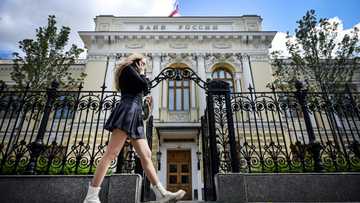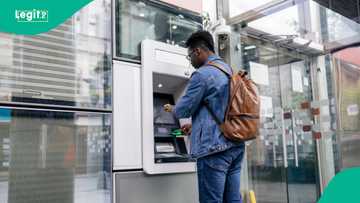UBA, Access, Zenith, Others List New Condition to Grant Loan to Customers
- In June, lending rates in the banking industry increased to an annual maximum of 60%
- The banking industry's credit to the private sector has decreased as a result of rising interest rates
- The yearly interest rate on loans for agriculture and oil and gas production might reach 48%
Legit.ng journalist Zainab Iwayemi has over 3-year-experience covering the Economy, Technology, and Capital Market.
Due to the impact of high interest rates, lending rates in the banking sector skyrocketed to as high as 60% annually in June, which resulted in a reduction in credit to the private sector.

Source: Getty Images
The country's banks' net domestic lending to the public and private sectors fell by 1.5%, according to data from the Central Bank of Nigeria (CBN).
According to analysis by Leadership, the data shows that in June 2024, net credit to the economy decreased from N102.68 trillion in May to N101.178 trillion.
PAY ATTENTION: Click “See First” under the “Following” tab to see Legit.ng News on your Facebook News Feed!
Since June's lending rates in the banking sector increased to as high as 60% annually, the impact of high interest rates has resulted in a decline in the banking industry's credit to the private sector.
The Central Bank of Nigeria (CBN) released data indicating a 1.5% decrease in net domestic lending by Nigerian banks to the public and private sectors. Net credit to the economy decreased in June 2024 from N102.68 trillion in May to N101.178 trillion, according to the data.
At its most recent meeting in July, the CBN's monetary policy committee maintained its aggressive approach to taming the nation's rapidly rising inflation. Following its July meeting, the MPC decided to increase the benchmark interest rate by 50 basis points, from 26.25 percent in May of this year to 26.75 percent.
According to the CBN's publication of bank deposit and lending rates as of July 5, 2024, interest rates on general loans might reach 60% annually, while rates on loans for general commerce and manufacturing could reach 50%.
Interest rates on loans for oil and gas and agricultural reached as high as 48% annually, while loans to the government incurred interest rates as high as 37%.
The highest interest rate ever seen by the banking industry for loans to the oil and gas and agriculture industries was forty percent in April, when the benchmark interest rate was 24.75%. Similarly, the maximum rate of lending to the manufacturing sector was 40%.
What expert said
Dr. Muda Yusuf, the chief executive of the Centre for Promotion of Private Enterprise (CPPE), had observed that the country's financial institutions' ability to provide financial intermediation would be further jeopardized by the high interest rate.
He added:
“The increase would constrain the capacity of banks to support economic growth and investment, especially in the real sector of the economy because the increases are quite significant.”
Whilst noting that the MPC’s hawkish stance appears to be moderated at its last meeting in July, he said, “although my preference was for a pause on the rate increases because of the enormity of the headwinds that businesses are grappling with. But the marginal increase marks a softening of the tightening stance. It is tolerable.
“I believe we should now accelerate the implementation of the fiscal policy measures to tackle inflation. Already the economic Stabilisation plan contains a number of laudable fiscal policy measures that could reduce production costs in the economy. ”
Dr. Francis Akpochafor, an economist at CashLinks, observed that when borrowers seek credit for consumption, investment, or working capital needs, they confront greater financial difficulties because banks charge higher interest rates on loans than on deposits.
“High borrowing costs can deter borrowing activity, constrain access to credit, and impede the growth and expansion of businesses, ultimately stifling entrepreneurial activity and innovation,” he stated.
Fidelis Obaniyi explained that the move aim to have a tighter monetary stance. He said, however, that the effectiveness of this also depends on the fiscal measure as the sidekick.
In his view, higher interest rates on loans could increase profits for banks as they tend to generate more income from lending.
He added,
“However, that could also trigger higher default rates because borrowers may also struggle to meet payment requirements, leading to increase in non-performing loans.”
“It also encourages commercial banks to improve lending practices, such as reducing exposure to risky borrowers, thereby enhancing financial stability in the banking sector.”

Read also
Nigeria’s dollar bond becomes worst-performing as protesters are gunned down in hunger protest
CBN releases rates on customers' savings accounts
Legit.ng reported that Deposit Money banks (DMBs) have increased their interest rates on deposits to reflect the latest Monetary Policy Rate announced by the Central Bank of Nigeria.
Legit.ng reported that the CBN raised the Monetary Policy Rate (MPR) to 24.75% in May 2024 from 22.75% in February 2024.
Checks showed that 18 Nigerian banks now offer their customers at least 7.88% interest on their deposits as of June 28, 2024.
PAY ATTENTION: Stay Informed and follow us on Google News!
Source: Legit.ng





